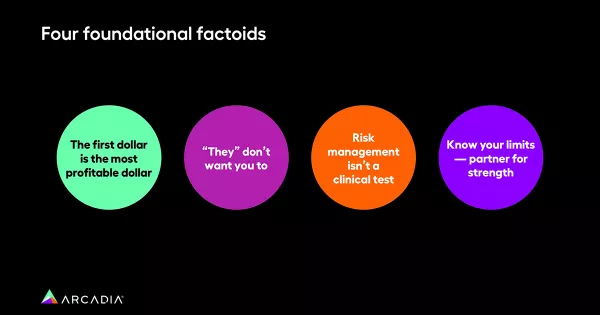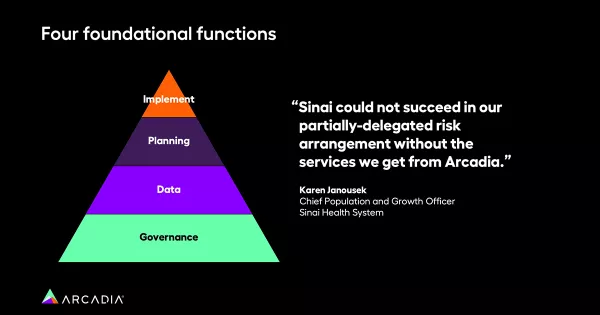Why wouldn’t you take on fully delegated risk?
Not taking on risk is getting harder and harder to avoid and may not be an option for much longer. The Medicare Savings Program (MSP) program has been functional for over ten years and more Medicare patients are involved in a Medicare Advantage program than ever before.
“The federal government, state governments, Medicaid, Medicare, everybody wants doctors and patients to be in a risk program,” said Brian Croegaert SVP, Value-Based Care Services at Arcadia.
Healthcare organizations often ask why they would take on risk and Croegaert’s response is “why wouldn’t you?” In Arcadia’s Byte-Sized Insights, he shared what Acadia has learned during the past 25 years it has supported organizations that have successfully taken on fully or partially delegated risk and managed their quality of care.
Four foundational facts of risk programs

Croegaert explains that there are four foundational functions organizations have to consider regarding risk:
- The first dollar is the most profitable — Most insurance companies take away the first dollar. That dollar is available to providers and healthcare organizations taking on risk
- “They” don’t want you to — It’s easier and more profitable for insurance companies to take the risk; therefore, they prefer healthcare organizations do not. However, risk programs can be valuable to healthcare organizations and new revenue generators for struggling hospital systems.
- Risk management isn’t a clinical task — Taking risk doesn’t make any kind of difference on the clinical outcomes of the patients. If anything, spending money up front will reduce costs later. Sick patients cost more, so increase expenses up front to support monitoring and stability to bring better health and fiscal outcomes in the long run.
- Know your limits — Healthcare systems are not insurance companies and can be taken advantage of quickly, therefore partner for strength and understand your data.
Mt. Sinai’s risk program in Chicago

Mt. Sinai is an urban health system that serves 1.5 million people with diverse needs who live on the west and southwest side of Chicago. Its risk program, now in place for 15 years, shows it is possible to be successful in zip codes that have poor health literacy and are highly impacted by social determinants of health. It requires using data to identify the patients to think about first — those who are the most sick, those who are not showing up, and those who are chronically ill.
To launch its program, Mt. Sinai thoughtfully created a planning team which included Arcadia, the quality, finance, planning, and marketing teams, and neighborhood community organizations. It brought all of the data and stakeholders into one place to build the risk program.
“The risk they’ve built up becomes a profit margin that goes back into the physician offices to allow them to buy bigger and better EHR systems, allows them to do bigger and better disease management, hires people from the community and supports all the local independent organizations throughout their area that take care of the patients,” explained Croegaert.
Partnering for success
Taking on risk doesn’t have to be scary and can actually be a valuable revenue stream for your organization. Working with an experienced partner can simplify the process. Arcadia’s data and platform supports many health systems like Mt. Sinai in their success taking on risk. Watch more Byte-Sized Insights or request a demo to learn how we can put your data to work, together.
